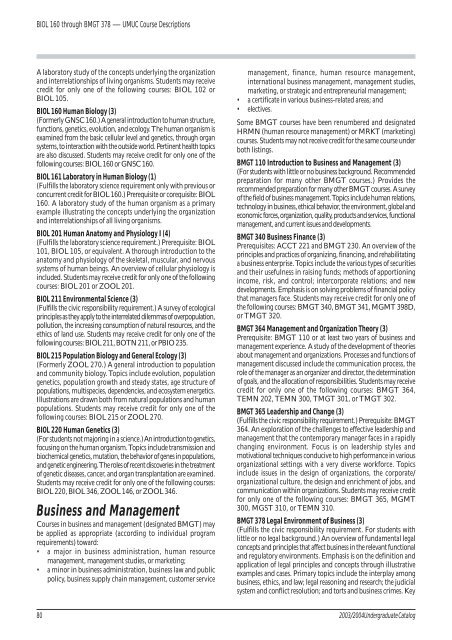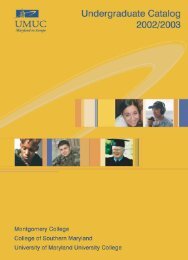Undergraduate - UMUC Europe
Undergraduate - UMUC Europe
Undergraduate - UMUC Europe
Create successful ePaper yourself
Turn your PDF publications into a flip-book with our unique Google optimized e-Paper software.
BIOL 160 through BMGT 378 — <strong>UMUC</strong> Course Descriptions<br />
A laboratory study of the concepts underlying the organization<br />
and interrelationships of living organisms. Students may receive<br />
credit for only one of the following courses: BIOL 102 or<br />
BIOL 105.<br />
BIOL 160 Human Biology (3)<br />
(Formerly GNSC 160.) A general introduction to human structure,<br />
functions, genetics, evolution, and ecology. The human organism is<br />
examined from the basic cellular level and genetics, through organ<br />
systems, to interaction with the outside world. Pertinent health topics<br />
are also discussed. Students may receive credit for only one of the<br />
following courses: BIOL 160 or GNSC 160.<br />
BIOL 161 Laboratory in Human Biology (1)<br />
(Fulfills the laboratory science requirement only with previous or<br />
concurrent credit for BIOL 160.) Prerequisite or corequisite: BIOL<br />
160. A laboratory study of the human organism as a primary<br />
example illustrating the concepts underlying the organization<br />
and interrelationships of all living organisms.<br />
BIOL 201 Human Anatomy and Physiology I (4)<br />
(Fulfills the laboratory science requirement.) Prerequisite: BIOL<br />
101, BIOL 105, or equivalent. A thorough introduction to the<br />
anatomy and physiology of the skeletal, muscular, and nervous<br />
systems of human beings. An overview of cellular physiology is<br />
included. Students may receive credit for only one of the following<br />
courses: BIOL 201 or ZOOL 201.<br />
BIOL 211 Environmental Science (3)<br />
(Fulfills the civic responsibility requirement.) A survey of ecological<br />
principles as they apply to the interrelated dilemmas of overpopulation,<br />
pollution, the increasing consumption of natural resources, and the<br />
ethics of land use. Students may receive credit for only one of the<br />
following courses: BIOL 211, BOTN 211, or PBIO 235.<br />
BIOL 215 Population Biology and General Ecology (3)<br />
(Formerly ZOOL 270.) A general introduction to population<br />
and community biology. Topics include evolution, population<br />
genetics, population growth and steady states, age structure of<br />
populations, multispecies, dependencies, and ecosystem energetics.<br />
Illustrations are drawn both from natural populations and human<br />
populations. Students may receive credit for only one of the<br />
following courses: BIOL 215 or ZOOL 270.<br />
BIOL 220 Human Genetics (3)<br />
(For students not majoring in a science.) An introduction to genetics,<br />
focusing on the human organism. Topics include transmission and<br />
biochemical genetics, mutation, the behavior of genes in populations,<br />
and genetic engineering. The roles of recent discoveries in the treatment<br />
of genetic diseases, cancer, and organ transplantation are examined.<br />
Students may receive credit for only one of the following courses:<br />
BIOL 220, BIOL 346, ZOOL 146, or ZOOL 346.<br />
Business and Management<br />
Courses in business and management (designated BMGT) may<br />
be applied as appropriate (according to individual program<br />
requirements) toward:<br />
a major in business administration, human resource<br />
management, management studies, or marketing;<br />
a minor in business administration, business law and public<br />
policy, business supply chain management, customer service<br />
80<br />
management, finance, human resource management,<br />
international business management, management studies,<br />
marketing, or strategic and entrepreneurial management;<br />
a certificate in various business-related areas; and<br />
electives.<br />
Some BMGT courses have been renumbered and designated<br />
HRMN (human resource management) or MRKT (marketing)<br />
courses. Students may not receive credit for the same course under<br />
both listings.<br />
BMGT 110 Introduction to Business and Management (3)<br />
(For students with little or no business background. Recommended<br />
preparation for many other BMGT courses.) Provides the<br />
recommended preparation for many other BMGT courses. A survey<br />
of the field of business management. Topics include human relations,<br />
technology in business, ethical behavior, the environment, global and<br />
economic forces, organization, quality, products and services, functional<br />
management, and current issues and developments.<br />
BMGT 340 Business Finance (3)<br />
Prerequisites: ACCT 221 and BMGT 230. An overview of the<br />
principles and practices of organizing, financing, and rehabilitating<br />
a business enterprise. Topics include the various types of securities<br />
and their usefulness in raising funds; methods of apportioning<br />
income, risk, and control; intercorporate relations; and new<br />
developments. Emphasis is on solving problems of financial policy<br />
that managers face. Students may receive credit for only one of<br />
the following courses: BMGT 340, BMGT 341, MGMT 398D,<br />
or TMGT 320.<br />
BMGT 364 Management and Organization Theory (3)<br />
Prerequisite: BMGT 110 or at least two years of business and<br />
management experience. A study of the development of theories<br />
about management and organizations. Processes and functions of<br />
management discussed include the communication process, the<br />
role of the manager as an organizer and director, the determination<br />
of goals, and the allocation of responsibilities. Students may receive<br />
credit for only one of the following courses: BMGT 364,<br />
TEMN 202, TEMN 300, TMGT 301, or TMGT 302.<br />
BMGT 365 Leadership and Change (3)<br />
(Fulfills the civic responsibility requirement.) Prerequisite: BMGT<br />
364. An exploration of the challenges to effective leadership and<br />
management that the contemporary manager faces in a rapidly<br />
changing environment. Focus is on leadership styles and<br />
motivational techniques conducive to high performance in various<br />
organizational settings with a very diverse workforce. Topics<br />
include issues in the design of organizations, the corporate/<br />
organizational culture, the design and enrichment of jobs, and<br />
communication within organizations. Students may receive credit<br />
for only one of the following courses: BMGT 365, MGMT<br />
300, MGST 310, or TEMN 310.<br />
BMGT 378 Legal Environment of Business (3)<br />
(Fulfills the civic responsibility requirement. For students with<br />
little or no legal background.) An overview of fundamental legal<br />
concepts and principles that affect business in the relevant functional<br />
and regulatory environments. Emphasis is on the definition and<br />
application of legal principles and concepts through illustrative<br />
examples and cases. Primary topics include the interplay among<br />
business, ethics, and law; legal reasoning and research; the judicial<br />
system and conflict resolution; and torts and business crimes. Key<br />
2003/2004<strong>Undergraduate</strong> Catalog






